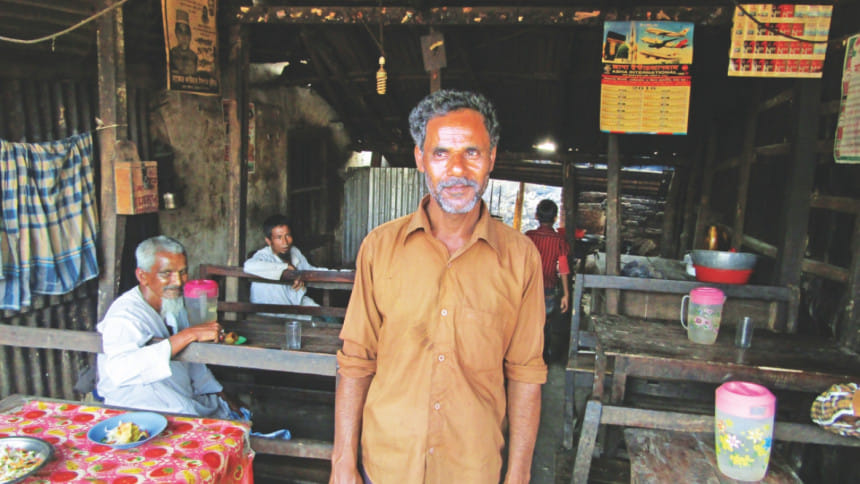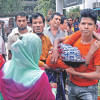Heart of gold

Far from home and still further from peace of mind, nobody knows how the handful of mentally ill outsiders arrived over the years, in Sagoria Bazar of Noakhali's Hatiya Island. Locals speculate they accidentally hitched a ride on a Hatiya-bound ship and, once on the island, never found a way off.
Without local kin or lifetime neighbours, without organised support, the mentally ill outsiders rely on islanders' kindness to meet daily needs. In teashop proprietor Abu Kalam, 48, in particular, they have found a loyal friend.
“Anwar likes to shred paper,” Kalam says. “He likes to clean. If Anwar sees any dirty area in the market he tidies it.”
Anwar has lived in the area for over a decade and villagers say he's Indian because originally he only spoke Hindi. It's also possible he's from a tea garden.
“Once I tried to ask where he was from. He just stayed silent,” says Kalam. “He knows some Bangla words now.”
Anwar reaches Kalam's teashop daily. He feels comfortable enough at Abu Kaka's, as the teashop is called, to voice food preferences in Bangla words: tea, a bun or vegetables.
When he's done, he helps, filling table jugs unasked or fetching tube well water. More than anything he likes cleaning.
“One evening I saw him asleep in his usual place on the high school veranda,” says Kalam. “He was totally covered in mosquitoes. Then I really understood Anwar is ill. It's not possible to sleep through that.”
Anwar is greeted by many in the market but it's Kalam who is his friend. When Kalam catches Anwar by the scruff of the neck, Anwar laughs with joy. He recognises a friend's banter. “Anwar is a big eater,” says Kalam. “He drinks up to three jugs of water at one sitting.”
Another regular, Altaf, is altogether different. “Altaf just sits,” says Kalam. “Occasionally he eats a little.” In his early 40s, Altaf has the habit of obsessively blowing on his hand and sometimes he suddenly runs, furious and shouting as though arguing with relatives.
Miah Hagla, meaning Miah-the-fool in Hatiyan Bangla, isn't an outsider. The 60-year-old is from neighbouring Sonadia union where he has a home but nobody to care for him. He swears at people. He gives blessings. “People come to him,” Kalam says. “He gets around ten new shirts and lungis per month from followers.”
On an average day, three to five mentally ill regulars arrive to dine for free at Abu Kaka's. “I don't feed them thrice a day because they have no schedule,” Kalam says, “When they arrive I give what I have.”
Of the thirty-odd teashops in Sagoria Bazar his is the only one to provide food so consistently. It's a practice that Kalam, son of a farmer, has continued since opening his first teashop after the devastating 1991 cyclone.
“From the beginning there was Modhu Mama,” he recalls. “He was from Brahmanbaria and nobody could understand much of his speech. He had his own language.” Modhu Mama spent the rest of his life in Hatiya. A few years ago he died, aged around 60.
“I love all people,” Kalam says when asked why he feeds the mentally ill. “I love to talk with the mentally ill. I love them too.” With no history of mental illness in his family, there's no personal motivation.
Mental illness is not always convenient. Modhu Mama often soiled his lungi such way that many were repulsed by his smell. But Kalam offered understanding and compassion regardless.
“There used to be two from Barisal,” Kalam says, “Then we had a teacher from Patuakhali who took one home again. I heard they belonged to a rich family.”
Kalam has his own family of four sons and one daughter. His oldest son is a Higher School Certificate candidate. He admits family expenses are onerous. Yet neither Kalam's wife nor children object to his caring for vulnerable strangers.
“What can my family say about it?” poses Kalam philosophically, “It's me making the income. Anyway, sometimes I take my guests home too.”
Other teashop customers are not always as tolerant. “Some are uncomfortable eating beside a mentally ill visitor,” Kalam says, “In my opinion, if you're not eating beside a mentally ill person it's your bad luck!”
While some locals blame insanity on possession by supernatural spirits like jinns or bhoots, Kalam traces its cause to stress. He believes that life's hardships can sometimes push a mind too far. “But I'm different,” he freely admits. “I like to walk in the dark. I don't use a light.” It's a habit that would have others concerned about the risk of spirit attack.
Although Kalam believes caring for others is a good deed in Islam, from his conversation it's clear that he does it quite simply because, for him, caring for another human is the most natural thing there could be to do.
“It'd be nice if the mentally ill had three proper meals and good shelter, at a minimum,” he says, considering the future.
It's evening now. Darkness has come as our chat is done. I want to return the following morning for photographs and ask what time I might meet one of his regulars. “They come at any time,” Kalam reminds me, “but if you want Anwar, I'll catch him!” The Daily Star decided it would do as well to let Anwar be.

 For all latest news, follow The Daily Star's Google News channel.
For all latest news, follow The Daily Star's Google News channel. 








Comments